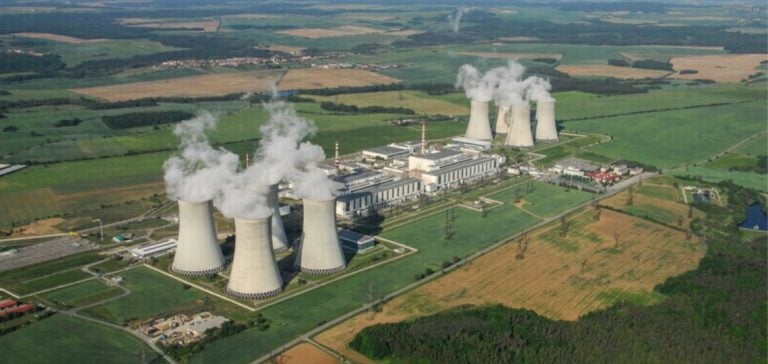The Czech nuclear project at the Dukovany power plant, won by South Korea’s Korea Hydro & amp; Nuclear Power (KHNP), faces major legal hurdles. The company was selected in July to build two new reactors at the plant, a strategic project for the Czech energy mix.
However, its direct competitors, EDF and Westinghouse, are contesting the decision. EDF, a major player in European nuclear power, is seeking to verify whether the tender complied with fair trade principles.
For its part, Westinghouse accuses KHNP of unauthorized use of its patented technologies in the design of the reactors.
This technological quarrel, although common in major industrial projects, could have an impact on the project schedule.
The Czech Republic faces a strategic challenge
For the Czech Republic, the stakes involved in this nuclear project are crucial.
Faced with the need to decarbonize its energy sector, Prague is counting on nuclear power to ensure its energy independence.
Czech Prime Minister Petr Fiala stresses the importance of this project for the country’s energy future.
However, he also stresses that the realization of this collaboration will depend on the final signing of the contracts, scheduled for March 2025.
This process remains conditional on the resolution of the appeals lodged.
One of the most sensitive issues is the technologies underlying the project.
Westinghouse claims that KHNP does not have the rights to sub-license certain technologies critical to the construction of the reactors, creating a complex situation that could lead to prolonged legal deadlock.
If this dispute is not resolved quickly, delays could multiply.
A precedent in the United Arab Emirates
This is not the first time that KHNP has faced such legal challenges.
In 2009, during construction of the Barakah power plant in the United Arab Emirates, a similar dispute arose with Westinghouse.
In the end, a compromise was reached, allowing construction to continue.
Industry analysts are hopeful that a similar solution can be found for the Czech project.
However, uncertainties remain as to the speed and feasibility of this settlement.
South Korean President Yoon Suk Yeol, on a visit to Prague, was optimistic about a favorable outcome.
He spoke of the possibility of replicating the model resolution adopted in Barakah, while expressing confidence in KHNP’s role as a key partner of the Czech Republic for the country’s energy future.
Prospects for industrial collaboration
In parallel with the recourse discussions, KHNP has already signed 76 memorandums of understanding with Czech companies.
These agreements stipulate that 60% of the materials used to build the reactors will be supplied locally.
This strategy aims to strengthen the involvement of local industries in the project, an essential factor in securing the support of local stakeholders and minimizing internal opposition.
However, this dynamic of industrial collaboration could be disrupted if the disputes are not resolved quickly.
An unfavorable outcome for KHNP could not only jeopardize its involvement, but also reopen the way to new tenders, offering a new opportunity for EDF and Westinghouse to prevail.
A conditional future
The Czech Republic finds itself in a delicate situation.
On the one hand, it wants to make rapid progress on its energy diversification plan, with increasing reliance on nuclear power to achieve its decarbonization objectives.
On the other, it must deal with the legal and technological issues surrounding the Dukovany project.
Discussions between Washington, Seoul and Prague will be decisive for the future.
For the time being, the Czech government, led by President Petr Pavel, remains cautious but confident.
In its view, the probability of the project’s total failure is low, but it acknowledges that nothing is certain yet.
This uncertainty remains central to the risk management strategy of both the government and the companies involved.
As the deadline for signing the contracts approaches, pressure is mounting on all stakeholders to achieve a speedy resolution to the disputes.
The future of this project will largely depend on the progress of negotiations between KHNP, Westinghouse and EDF.





















